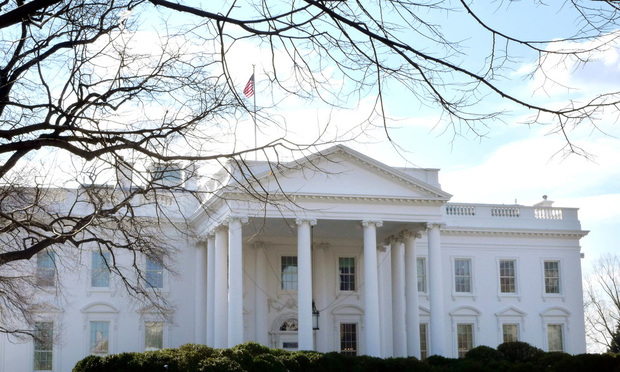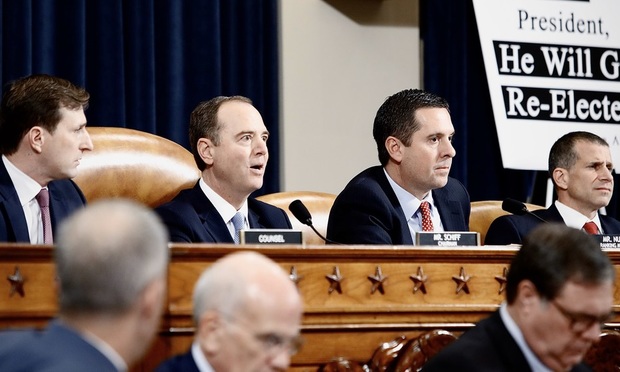New Testimony Puts Focus on White House Lawyer Eisenberg's Role in Ukraine Affair
John Eisenberg, the top lawyer for the National Security Council and a former Kirkland & Ellis partner, has refused to sit for questioning in the House impeachment inquiry. But he figured prominently at Tuesday's hearing.
November 19, 2019 at 03:23 PM
7 minute read
The original version of this story was published on National Law Journal
 The White House. Credit: Diego M. Radzinschi
The White House. Credit: Diego M. Radzinschi
Updated at 6:04 p.m.
On the morning of July 25, Lt. Col. Alexander Vindman was in the White House situation room, listening to a call between President Donald Trump and Ukraine's newly elected leader, Volodymyr Zelensky.
It was on that call that Trump uttered the words that would trigger the House's impeachment inquiry. Trump asked Ukraine's president to investigate—as "a favor"—former Vice President Joseph Biden and his son Hunter.
Vindman, the director for European affairs on the National Security Council, recounted Tuesday that he "couldn't believe" what he was hearing.
"What I heard was inappropriate," Vindman testified, during the third day of public testimony in the House impeachment inquiry. "And I reported my concerns to Mr. Eisenberg."
John Eisenberg, the top lawyer for the National Security Council and a former Kirkland & Ellis partner, has refused to sit for questioning in the House impeachment inquiry. But he figured prominently at Tuesday's hearing as House lawmakers delved into the internal White House alarm over Trump's apparent effort to leverage congressionally approved military aid to Ukraine for assistance against a domestic political opponent.
A White House representative on Tuesday said in a statement: "We have learned nothing new in today's illegitimate 'impeachment' proceedings. However, buried among the witnesses' personal opinions and conjecture about a call the White House long ago released to the public, both witnesses testified the July 25 transcript was 'accurate' and nothing President Trump has done or said amounts to 'bribery' or any other crime."
Eisenberg was named repeatedly as Vindman recounted twice raising concerns about the pressure campaign. The first time following a July 10 meeting in which Gordon Sondland, the U.S. ambassador to the European Union, pushed a pair of Ukrainian officials to investigate the Bidens. Vindman returned to Eisenberg after the July 25 phone call now at the center of the House's impeachment probe.
In some of the crucial exchanges of Vindman's testimony, Eisenberg was referred to simply as "the lawyer."
 Left to right, House counsel Daniel Goldman; Intelligence Committee Chairman Adam Schiff; Ranking Member Devin Nunes; and Republican counsel Stephen Castor. Credit: Diego M. Radzinschi / ALM
Left to right, House counsel Daniel Goldman; Intelligence Committee Chairman Adam Schiff; Ranking Member Devin Nunes; and Republican counsel Stephen Castor. Credit: Diego M. Radzinschi / ALM"The very same issue that prompted you to go talk to the lawyer ends up coming in that call with the president, is that correct?" asked U.S. Rep. Adam Schiff, D-California, the chairman of the House Intelligence Committee.
"That is correct," Vindman answered.
"And it is that conversion that once again led you back to the lawyer's office," Schiff asked.
"That is correct," Vindman replied.
Eisenberg has come under scrutiny for his role in moving a transcript of the July 25 call to a highly classified server, a step other officials have described as at odds with standard White House protocol. His defenders have asserted Eisenberg did nothing improper in securing the rough transcript, a move that would help eliminate any leaks of its contents.
In his testimony Tuesday, Vindman said he believed the transcript was transferred to that server intentionally, contradicting the testimony of former National Security Council official Tim Morrison, who said in a closed-door deposition that the transcript had been mistakenly moved to that system.
"When it was mentioned that [the transcript] was sensitive, it was an on-the-fly decision to segregate it in the other system," Vindman said.
Vindman said he did not view the move "as anything nefarious." He added that two "substantive items" were missing from the transcript: a reference to "recordings" and to Burisma, the Ukrainian energy company where Hunter Biden was a board member. He did not see the omissions as a "big deal."
"I'd say it's informed speculation that the folks that produce these transcripts do the best they can, and they just didn't catch the word," he said.
Morrison, joined by Cozen O'Connor senior counsel Barbara Van Gelder, testified that he wanted access to the transcript to be restricted. But, he said, "it was represented to me that it was a mistake" for the transcript to be placed on the highly classified server. Morrison said Eisenberg inquired about how the transcript was placed on the classified system and learned it was an "administrative error."
When the House Republicans' counsel, Steve Castor, asked to clarify that there was no "malicious intent" in moving the transcript to the highly-secure server, Morrison replied, "Correct."
After reporting his concerns to Eisenberg about the July 25 call, Vindman said he spoke with State Department official George Kent and an intelligence community official, whom he declined to name. Vindman testified that Eisenberg circled back with him after hearing from the general counsel of "one of the intelligence bodies" about information on the call.
"At that point, Mr. Eisenberg said I shouldn't talk to anyone else about it," Vindman said.
Vindman was joined at Tuesday's hearing by his lawyer, Mike Volkov, and testified alongside Jennifer Williams, an adviser to Vice President Mike Pence. Williams also listened to the July 25 call and described it Tuesday as "unusual" for including a reference to a "domestic political matter."
She was accompanied by her lawyer, Justin Shur, a partner at MoloLamken, who at one point stepped in to prevent her from testifying about a call between Pence and Zelensky.
Shur said the vice president's office had deemed the call classified and told House lawmakers, "I've advised Ms. Williams to not answer further questions about that call in an unclassified setting."
Before they testified, Vindman delivered an opening statement in which he described Trump's personal lawyer, Rudy Giuliani, as a "disruptive" actor who undermined U.S. foreign policy toward Ukraine. Giuliani has been accused of running a shadow foreign policy to pressure Ukraine to investigate Biden and also a debunked theory that the country interfered in the 2016 U.S. presidential election.
"It is improper for the president of the United States to demand a foreign government investigate a U.S. citizen and political opponent," Vindman said.
Later, he said he relayed his concerns about the Trump administration's dealings with Ukraine "out of a sense of duty."
At the end of Tuesday's hearing, a Republican lawmaker questioned whether Vindman had gone outside the chain of command in raising his concerns to Eisenberg rather than his direct supervisor, Morrison.
Schiff, in his closing remarks, came to Vindman's defense, saying that Morrison "didn't go to his supervisor either" following the July 25 call.
"He went directly to the National Security Council lawyer," Schiff said.
Read more:
House Impeachment Lawyers Duel as Witness Testimony Goes Public
How Major US Firms Prepared House Impeachment Witnesses
'Let's Motor Through, Chairman': How Robert Luskin Guided Gordon Sondland
'Barely-Lawyered Temper Tantrum': What Lawyers Said About Cipollone's Letter
16 Conservative Lawyers Say They Support 'Expeditious' Impeachment Inquiry
This content has been archived. It is available through our partners, LexisNexis® and Bloomberg Law.
To view this content, please continue to their sites.
Not a Lexis Subscriber?
Subscribe Now
Not a Bloomberg Law Subscriber?
Subscribe Now
NOT FOR REPRINT
© 2025 ALM Global, LLC, All Rights Reserved. Request academic re-use from www.copyright.com. All other uses, submit a request to [email protected]. For more information visit Asset & Logo Licensing.
You Might Like
View All
With DEI Rollbacks, Employment Lawyers See Potential For Targeting Corporate Commitment to Equality
7 minute read
MoFo Associate Sees a Familiar Face During Her First Appellate Argument: Justice Breyer

Amid the Tragedy of the L.A. Fires, a Lesson on the Value of Good Neighbors
Trending Stories
- 1BOI Reports: What Business Owners and Attorneys Should Know
- 2SurePoint Acquires Legal Practice Management Company ZenCase
- 3Day Pitney Announces Partner Elevations
- 4The New Rules of AI: Part 2—Designing and Implementing Governance Programs
- 5Plaintiffs Attorneys Awarded $113K on $1 Judgment in Noise Ordinance Dispute
Who Got The Work
J. Brugh Lower of Gibbons has entered an appearance for industrial equipment supplier Devco Corporation in a pending trademark infringement lawsuit. The suit, accusing the defendant of selling knock-off Graco products, was filed Dec. 18 in New Jersey District Court by Rivkin Radler on behalf of Graco Inc. and Graco Minnesota. The case, assigned to U.S. District Judge Zahid N. Quraishi, is 3:24-cv-11294, Graco Inc. et al v. Devco Corporation.
Who Got The Work
Rebecca Maller-Stein and Kent A. Yalowitz of Arnold & Porter Kaye Scholer have entered their appearances for Hanaco Venture Capital and its executives, Lior Prosor and David Frankel, in a pending securities lawsuit. The action, filed on Dec. 24 in New York Southern District Court by Zell, Aron & Co. on behalf of Goldeneye Advisors, accuses the defendants of negligently and fraudulently managing the plaintiff's $1 million investment. The case, assigned to U.S. District Judge Vernon S. Broderick, is 1:24-cv-09918, Goldeneye Advisors, LLC v. Hanaco Venture Capital, Ltd. et al.
Who Got The Work
Attorneys from A&O Shearman has stepped in as defense counsel for Toronto-Dominion Bank and other defendants in a pending securities class action. The suit, filed Dec. 11 in New York Southern District Court by Bleichmar Fonti & Auld, accuses the defendants of concealing the bank's 'pervasive' deficiencies in regards to its compliance with the Bank Secrecy Act and the quality of its anti-money laundering controls. The case, assigned to U.S. District Judge Arun Subramanian, is 1:24-cv-09445, Gonzalez v. The Toronto-Dominion Bank et al.
Who Got The Work
Crown Castle International, a Pennsylvania company providing shared communications infrastructure, has turned to Luke D. Wolf of Gordon Rees Scully Mansukhani to fend off a pending breach-of-contract lawsuit. The court action, filed Nov. 25 in Michigan Eastern District Court by Hooper Hathaway PC on behalf of The Town Residences LLC, accuses Crown Castle of failing to transfer approximately $30,000 in utility payments from T-Mobile in breach of a roof-top lease and assignment agreement. The case, assigned to U.S. District Judge Susan K. Declercq, is 2:24-cv-13131, The Town Residences LLC v. T-Mobile US, Inc. et al.
Who Got The Work
Wilfred P. Coronato and Daniel M. Schwartz of McCarter & English have stepped in as defense counsel to Electrolux Home Products Inc. in a pending product liability lawsuit. The court action, filed Nov. 26 in New York Eastern District Court by Poulos Lopiccolo PC and Nagel Rice LLP on behalf of David Stern, alleges that the defendant's refrigerators’ drawers and shelving repeatedly break and fall apart within months after purchase. The case, assigned to U.S. District Judge Joan M. Azrack, is 2:24-cv-08204, Stern v. Electrolux Home Products, Inc.
Featured Firms
Law Offices of Gary Martin Hays & Associates, P.C.
(470) 294-1674
Law Offices of Mark E. Salomone
(857) 444-6468
Smith & Hassler
(713) 739-1250







